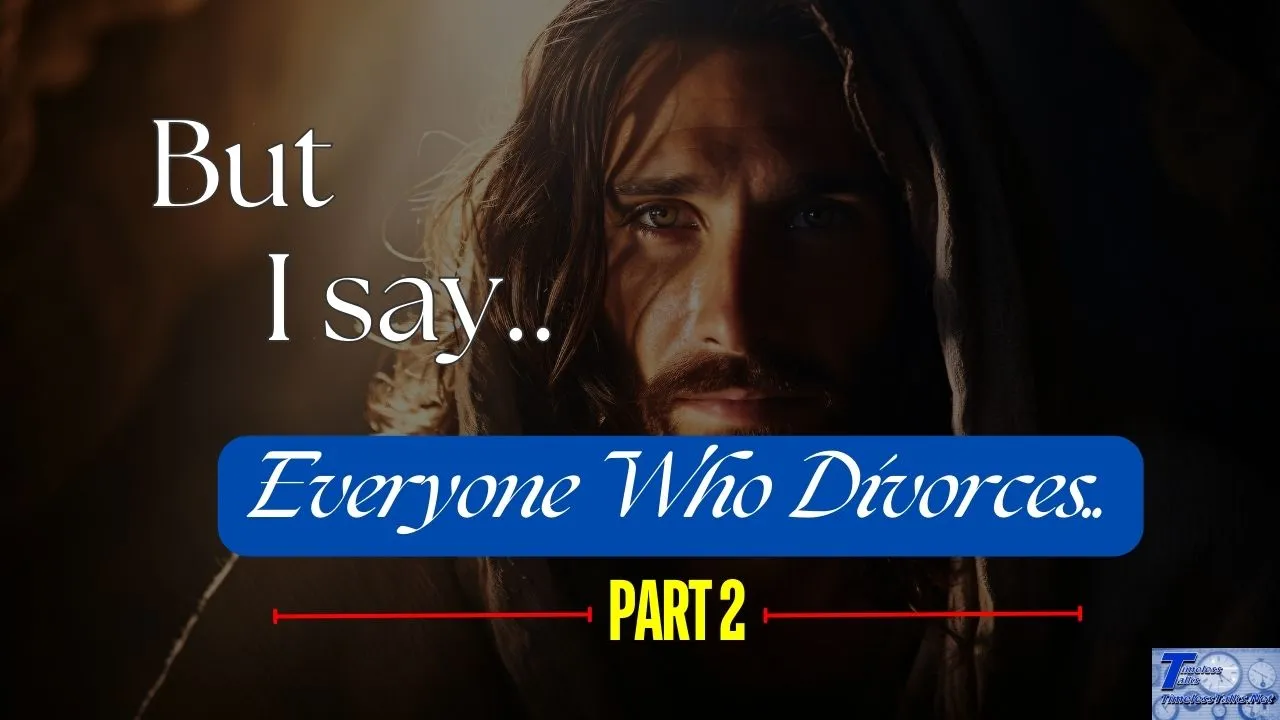"But I Say...
Everyone Who Divorces...:
Part 2" Transcript
Spoken by John Ratliff and Barry Haynes
Transcribed by Tim Estes
You can:
- DOWNLOAD offline on your computer/tablet/phone as a PDF file and read it anytime, OR
- Use the CONTACT LINK above (under Services) to request your collection be sent to you via USPS. This will REQUIRE you to include your mailing address (U.S. only).
But I Say… Everyone Who Divorces… Part 2
Barry
In America in the 1970s, there was the rise of what was known as no fault divorce. In other words, there was no one that had to prove grounds that there was a divorce, there was adultery or, or abuse or whatever. You just didn’t say, well, we just didn’t want to be married anymore. No one’s at fault. And that idea has kind of crept in our society of divorce. There’s no fault, no harm, no foul.
But is that really the case? We’re going to look at a part of the verse where Jesus teaches us about divorce that helps us to understand how divorce is more damaging than we might think.
INTRO
John
Now, before we get into this, there is a “Part 1” to this series. So, you might want to go back and look at it. Because it will help you understand a little bit more about what we’re talking about here in the verse we’re considering.
We’re in Matthew 5:32 and in this section Jesus has said, “You have heard that it was said… But I say to you.” And so in verse 32, Jesus said, “…But I say to you that whoever divorces his wife for any reason except sexual morality causes her to commit adultery….”
And it’s really the idea of causes her that we want to look at for a moment.
Barry
Yeah. Because when you, when you first read that, it might pop in your mind that says, well, this other person is divorcing him and then they’re being made to do something wrong that they didn’t do wrong. If the other one cheated on them, or they decided one day I don’t want to be married anymore and they’re walking out the door. And then you say this person’s been put into an adultery. They’re adulterous now and that seems unfair. It seems wrong. Especially when you look in Jesus’s day where women didn’t have the rights that men had. And so they couldn’t seek for a divorce or get a divorce.
It put them in a terrible situation. You think, “Why would Jesus put that on a person, put that on some woman. But I think it helps us to kind of really understand the original language and what’s trying to be said here.
John
Absolutely, because when you look at this idea that Jesus is stressing, he talks about causes her to do something, and so it does sound like this is something she was forced to do.
However, when you look at that word “causes”, it actually means is “responsible for”. And so, it actually puts the blame back on the man in the situation because what he’s doing. He has now made her to appear like she’s actually an adulteress, whether she is or isn’t. Because that’s the concept that Jesus is expressing here.
Most translations actually consider adultery here a future possibility, uh, because this is most likely what she would probably do. Because in that society she had to have some way to live. And women during this time period, no offense ladies, they weren’t considered the highest standard of individuals.
Barry
Yeah, and it, it’s almost in essence saying you’re putting her in that situation where she’s going to have to commit adultery. You’ve done this to her. And I think that’s an important note for this idea. Because as we said earlier, we think divorce doesn’t harm anybody. You know, you’ll hear that from people.
Well, they couldn’t get along. They divorced. It’s no big deal. Or, especially when they have kids. It didn’t affect the kids and everything. But that’s just not true. Divorce is hard and it hurts people. And it, it damages things. And that’s exactly what Jesus’ point here is. When you decide, “I don’t want her anymore, I’m just going to throw her out”, you’re doing something to her that’s going to cause her harm. Irreparable harm. It’s bad.
And I think that’s why we have to be so diligent. People say, well, “Why are you so? Why would you push this issue so much?” Well, my first issue is because it matters to God. But also, too, I don’t think we realize how damaging it can be to some, to the spouse that you’re doing this to. She is someone that you said you loved. This is someone that you cared about. Why would you treat them in a way? Why would you do something to them that’s going to cause this amount of harm?
John
Absolutely. In fact, the Greek word there for “causes” that Jesus uses doesn’t actually say anything about what the woman might do in the future. Although she might very well commit adultery, as we mentioned, but the woman in this verse has been victimized, used by her husband. She’s been abandoned. And although she’s not committed adultery, her reputation has now been damaged.
People are going to look at her as if that was the case. We often don’t think about the damage that divorce does, and especially if eventually there are children involved also. Divorce is very damaging to the whole family dynamic. There was a reason that God wanted one man, one woman for the extent of their life.
Barry
And not even just to a local thing, but even to the stability of our society. One of the reasons we have found our country in the moral decline that it is today is because we have accepted divorce. The family is the moral heart of our country. And when we allow these things to happen, it has repercussions.
And I think some of the problems we see in our world today is a result of that. That selfishness in our marriage has resulted in selfishness in all our lives. And that’s why it’s so important that we consider God’s standard when it comes to marriage and divorce.
If you haven’t watched that first video, we encourage you to go back and watch it as well. We have some other resources that we’ve made available. You can click on as well if you want to find out some more information on this topic. And we’d love to hear from you. If you have any questions or comments, phone number below.
You can contact us, text us, call us. We’d love to hear from you. Or go to our Contact Page. And you can check and give us your information and we’ll get in contact with you that way. Thank you so much for watching and God bless.

